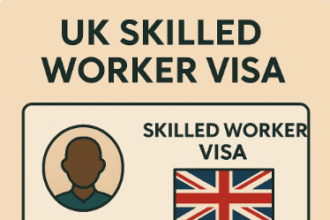Introduction to UK Visas
Visas play a critical role in the immigration framework of the United Kingdom, governing the entry and stay of individuals from outside the UK. A UK visa is an official document that grants individuals permission to travel to, enter, and remain in the country for a specified period or purpose. The necessity for a visa varies based on the traveler’s nationality, purpose of visit, and duration of stay, and serves as a critical regulatory measure to manage who can enter and reside within the UK.
The diverse types of UK visas reflect the varying needs and circumstances that travelers and immigrants encounter. For example, some individuals may seek to visit the UK for tourism, business engagements, or family reunification, while others may require visas for long-term objectives such as work, study, or asylum. Each visa category is designed to address specific circumstances, ensuring that the regulations surrounding entry are tailored to the distinct realities of individual applicants. This segmentation not only streamlines the immigration process but also safeguards the UK’s borders by ensuring that only eligible individuals are granted entry.
Understanding the different types of UK visas is essential for prospective travelers and migrants. Whether one is preparing for a short holiday, pursuing higher education, or seeking employment opportunities in the UK, familiarity with the visa application process can significantly influence the success of one’s journey. Furthermore, the requirements and validity periods associated with each visa type are also vital in planning a visit or relocation effectively. By comprehending the framework of UK visas, applicants can navigate their options more proficiently and enhance their likelihood of receiving the necessary permissions, thereby enriching their overall experience in the UK.
Visitor Visas
The Visitor Visa is a specific type of UK visa that caters to individuals intending to visit the United Kingdom for tourism, family gatherings, or short-term business engagements. This visa is crucial for people who wish to experience the culture of the UK, attend events, or meet friends and family residing in the country. Understanding the eligibility criteria is essential for a successful application.
To qualify for a Visitor Visa, applicants must demonstrate that they are planning to leave the UK at the end of their visit, possess sufficient funds to cover their stay, and provide evidence of accommodations, whether that be hotel reservations or invitations from friends and relatives. Additionally, applicants should not have any previous immigration violations, as this can impact their eligibility.
The application process for a Visitor Visa generally involves filling out an online application form, submitting supporting documentation, and attending a visa appointment at a designated center. Key documents include a valid passport, financial statements, proof of employment, and any necessary invitation letters. It is crucial that all information provided is accurate and complete to avoid delays in processing.
Once approved, a Visitor Visa typically permits stays of up to six months within a 12-month period. However, visitors should be aware of specific restrictions that accompany this visa. For instance, holders cannot work or study, marry, or live in the UK for an extended period on this visa. Adhering to the terms stipulated on the visa is essential, as violating these conditions may lead to future travel restrictions or bans.
Overall, the Visitor Visa serves as an essential gateway for many individuals seeking to explore the UK, while also necessitating adherence to stringent eligibility and compliance requirements.
Work Visas
The United Kingdom offers several types of work visas designed to cater to individuals aspiring to work within its borders. One prominent category is the Skilled Worker visa, which has replaced the previous Tier 2 (General) work visa. This visa facilitates entry for individuals who possess skills in shortage occupations or hold offers from approved employers. Applicants must meet certain eligibility requirements, such as a job offer from a licensed sponsor, proficiency in the English language, and a minimum salary threshold that aligns with UK macroeconomic conditions.
Another significant option is the Intra-company Transfer visa, intended for multinationals that wish to transfer employees from overseas branches to UK operations. The criteria include working for the organization for a specified period prior to the transfer, as well as a job role that meets the requisite skill level. This visa is particularly vital for businesses looking to retain talent across borders while ensuring compliance with UK immigration laws.
For individuals intending to start their own enterprises or engage in business activities, the Innovator visa serves as a suitable alternative. This visa targets experienced entrepreneurs who can present innovative business ideas vetted by an endorsing body. It encourages contributions to the UK’s economy by allowing visa holders to establish or run viable businesses within the country.
Additionally, the Global Health and Care Visa has been introduced to attract healthcare professionals from both the EU and non-EU nations. This visa addresses the pressing need for qualified staff within the UK’s health and social care sectors. Applicants need a job offer from an approved employer in specific roles, alongside compliance with English language proficiency requirements.
Understanding these different types of work visas is crucial for prospective applicants, as navigating the application processes and adhering to the eligibility criteria can significantly impact one’s employment opportunities in the UK. The complexities associated with UK work visas necessitate thorough research and perhaps professional guidance to enhance their chances of securing meaningful employment within this competitive market.
Study Visas
The United Kingdom offers various visa options for international students wishing to pursue their studies in the country. Two of the most prominent study visas are the Student visa and the Child Student visa. Both visa types have specific requirements that applicants must meet to qualify, ensuring that only those genuinely seeking to further their education in the UK are granted entry.
To apply for a Student visa, individuals must first secure an offer from a recognized educational institution. This is a critical step, as the institution must be authorized by the UK government and listed on the register of licensed sponsors. Once accepted, candidates will be required to demonstrate their ability to support themselves financially during their stay. This involves showing proof of having sufficient funds to cover tuition fees and living expenses, which is a fundamental requirement for obtaining a Student visa.
The Child Student visa caters primarily to younger applicants aged between four and seventeen who wish to study at independent schools in the UK. Similar to the Student visa, acceptance into a recognized institution is necessary. Additionally, there is an obligation for sponsors – typically the child’s parents or guardians – to show that they can financially support the child during their educational journey. This involves demonstrating adequate financial resources and sometimes even obtaining a letter of consent from the parents.
During the study period, visa holders may be allowed to work part-time, enhancing their experience and supporting their living costs. However, the specific working hours are subject to regulations based on the level of study and the visa type. It is important for students to familiarize themselves with these work rights to ensure compliance while managing their commitments effectively.
Family and Partner Visas
The United Kingdom offers several visa options for individuals seeking to join their family members or partners residing in the country. Family and partner visas are designed to facilitate the reunion of loved ones, ensuring that they can live together in the UK. Among the most common are spousal visas, dependant visas, and various family reunion pathways, each coming with specific requirements and eligibility criteria.
Spousal visas, often referred to as spouse or civil partner visas, allow individuals to live with their British citizen or settled partner. To qualify for a spousal visa, the applicant must demonstrate that the relationship is genuine and subsisting. Key documentation includes proof of marriage or civil partnership, evidence of cohabitation, and financial requirements—specifically, that the sponsor (the UK partner) must have a minimum income threshold. This income threshold ensures that the couple can support themselves without public funds.
In addition to spousal visas, dependant visas are available for children or other dependants of individuals who are on a valid UK visa. Dependants must meet certain criteria, which often involve age restrictions and proof of dependency. Applicants must provide supporting documents such as birth certificates for children or evidence of dependency for other relatives.
Family reunion pathways also exist for those who have been granted asylum or humanitarian protection in the UK. These visas typically allow the family members of the individual to join them in the country, reinforcing the importance of family unity in the face of adversity.
Navigating the intricate landscape of family and partner visas can be challenging. Thorough preparation and the provision of comprehensive documentation are crucial steps in the application process. Individuals are encouraged to familiarize themselves with the UK Home Office guidelines, which detail eligibility and required documents to ensure a smoother integration into life in the UK.
Health and Care Worker Visas
The Health and Care Worker visa, introduced to support the UK’s healthcare system, offers a pathway for qualified healthcare professionals to work in the UK. This visa category is tailored specifically for individuals working in the health and care sectors, reflecting the nation’s commitment to attracting skilled professionals needed to address the demands faced by the NHS and social care systems. To qualify, applicants must have a job offer from an approved UK employer in a relevant role, such as a doctor, nurse, or care worker.
Eligibility requirements include holding a job that is on the list of eligible occupations, possessing a recognized professional qualification, and meeting the English language proficiency standards. Moreover, healthcare professionals must adhere to survival guidelines set by their respective regulatory bodies. These aspects ensure that applicants are well-equipped to contribute positively to the UK’s health services.
The application procedure for the Health and Care Worker visa has been streamlined to encourage timely processing, which is vital given the high demand for healthcare workers. Applicants may benefit from a fast-track visa processing option, which can significantly reduce waiting times compared to other visa categories. In fact, many applicants receive their decisions within three weeks of submission, provided all documentation is in order.
There are numerous benefits associated with obtaining a Health and Care Worker visa, making it an attractive option for prospective applicants. Notably, visa holders are eligible for reduced application fees compared to other types of visas. Additionally, they may also qualify for exemption from the Immigration Health Surcharge, thereby allowing them to access the National Health Service without incurring extra costs. Furthermore, this visa type enables the holder to bring dependents to the UK, ultimately fostering a conducive environment for families. Overall, the Health and Care Worker visa is crucial in bolstering the UK healthcare workforce during challenging times.
Investor and Entrepreneur Visas
The United Kingdom offers specialized visas tailored for investors and entrepreneurs aiming to establish or contribute to business growth within the country. Notably, the Investor Visa and the Innovator Visa serve distinct purposes but share the common goal of fostering economic development. To qualify for the Investor Visa, an individual must possess a minimum investment of £2 million in UK government bonds, share capital, or loan capital in active and trading UK companies. This visa provides a pathway to indefinite leave to remain after five years, contingent upon maintaining the investment throughout this duration.
On the other hand, the Innovator Visa caters to those looking to establish a new business, requiring a minimum of £50,000 in investment funds. Applicants must present a viable business plan that is innovative, viable, and scalable, and this business idea must be endorsed by an approved UK organization. The Innovator Visa allows successful candidates to remain in the UK for three years, with the possibility of extension, and can lead to settlement after three years if certain conditions are met.
An integral aspect of both visa types is the necessity for a comprehensive business plan. This document should not only outline the operational strategy and financial forecasts but must also illustrate how the proposed venture aligns with market needs. For the Investor Visa, maintaining financial records and ensuring transparency is crucial to comply with UK immigration regulations. Similarly, Innovator Visa applicants must demonstrate ongoing growth and must adhere to the feedback from their endorsing body to ensure sustainability of their business model.
Thus, whether one is considering significant financial investment or entrepreneurship, understanding the specific requirements and processes associated with the UK Investor and Innovator Visas is vital for successful navigation of the immigration landscape.
Specialist Visas: An Overview
Specialist visas in the UK cater to individuals possessing unique skills, qualifications, or talents that contribute significantly to the nation’s workforce. Two notable types of specialist visas are the Graduate Visa and the Global Talent Visa, both designed to attract exceptional individuals to the UK.
The Graduate Visa is primarily intended for international students who have successfully completed their studies in the UK. This visa enables graduates to remain in the UK for a period of two years, or three years for doctoral graduates, and seek employment without the need for a sponsor. It allows holders to gain valuable work experience and to further their careers within a diverse and dynamic job market. This provision not only benefits the graduates but also assists UK employers in locating skilled labor that may otherwise be unavailable to them.
On the other hand, the Global Talent Visa is aimed at individuals who are recognized as leaders or potential leaders in their respective fields, including science, humanities, engineering, the arts, and technology. To qualify for this visa, applicants must be endorsed by an approved UK organization, showcasing their professional achievements and contributions to their area of expertise. The Global Talent Visa provides significant flexibility, allowing holders to live and work in the UK without the restrictions that typically accompany many other visa categories. Furthermore, it opens pathways for their families to join them in the UK.
Both the Graduate Visa and the Global Talent Visa exemplify the UK’s commitment to fostering a vibrant and talent-rich environment. They support not only individual growth but also contribute effectively to the broader UK economy by attracting and retaining top-tier professionals. Ultimately, these specialist visas play a crucial role in enhancing the global standing of the UK as a hub for innovation and excellence.
Applying for a UK Visa: A Step-by-Step Guide
Applying for a UK visa can seem daunting due to the various requirements and procedures involved. To streamline the process, it is imperative to follow a systematic approach. The initial step in applying for a UK visa is determining the appropriate visa category that corresponds to your purpose for visiting or residing in the UK. Whether it is for study, work, or family reunification, understanding the specific visa type is crucial.
Once the type of visa is identified, the next stage involves gathering the necessary documentation. Essential documents typically include a valid passport, recent photographs, proof of financial means, and any relevant certificates or letters supporting your application, such as acceptance letters from educational institutions or sponsor letters from employers. It is critical to ensure that all documents are up-to-date and meet the Home Office requirements. Failure to provide adequate documentation can lead to application refusal.
After assembling the needed paperwork, you may complete the application form, which can commonly be found on the official UK government website. Be cautious while filling out the form; ensuring accuracy and clarity will reduce the likelihood of errors that could delay the process. Once your application is submitted, an interview may be required. To prepare for this, it is advisable to review your application details thoroughly and to be ready to discuss your intentions for traveling to the UK.
Finally, after submitting your application, you should monitor the status and any updates. The processing time for UK visas varies widely depending on the type applied for and your country of residence, so patience is essential during this period. Additionally, upon receiving your visa approval, familiarize yourself with any post-application procedures to ensure compliance with UK regulations. By following these steps, applicants can enhance their chances of a successful visa application.




